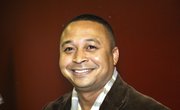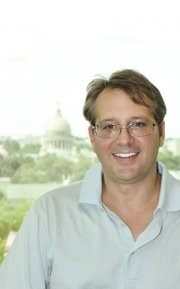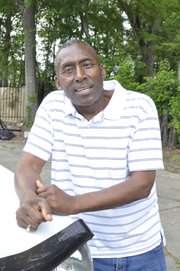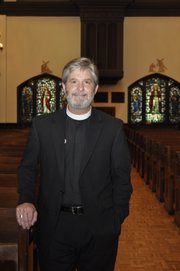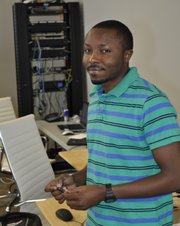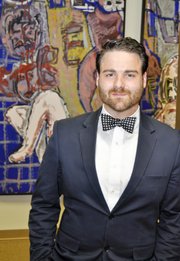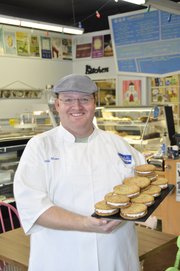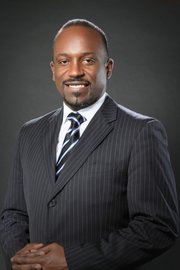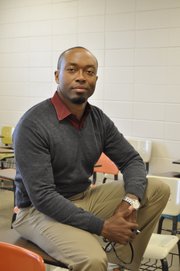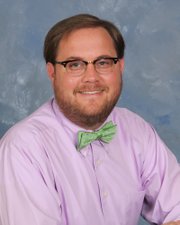Wednesday, June 11, 2014
On June 15, we honor the men in our lives who have made a difference. Daughters and sons honor their fathers. Children might honor their grandfathers. Mothers honor their husbands. It's all about men on that day. So as we remember the men in our lives, it's important to remember those who make an effort to help their community. Jackson Free Press' 2014 Dudes We Dig consist of men who help their communities, including a veteran who is an veterans' advocate, a conservative baker who is fighting against the recent passage of SB 2681, a veteran who helps fight obesity in our community, and a lawyer helping out small businesses and also aiding in the development of Jackson's historic districts. These men do many things, but one thing is clear—every single one is a Dude We Dig.
Anthony McIntyre
by Emma McNeel
Iraq war veteran Anthony McIntyre works tirelessly in both his job and his community service to aid veterans by making them aware of their available benefits. The 35-year-old moved from Las Vegas to Brandon when he was 2 years old because his father, a Vietnam veteran, wanted to become a farmer. At age 11, he got his first job picking peas and other crops. "I learned a very strong work ethic at a very young age," he says.
He grew up with his father's many stories about the military, so, "it was pretty much by design for me to go."
At 19, McIntyre joined the Army and spent the next eight years deployed in Korea, Iraq, Kuwait, and Fort Hood and served as an operations sergeant on his last tour. Upon his return in 2005, he got a degree in political science from Tougaloo College and a master's in public policy and public administration from Jackson State University. He maintained a 4.0 GPA during college, even after returning from war.
"I think I was still in combat mode when I came home because I never gave myself a chance to break," he says. "It was always, 'You got to go, you got to get this,' and maybe sometimes I expect too much and that's when I look at these veterans that are here now ... I don't want (them) to be in a predicament like I (was)."
McIntyre works with the both federal government and volunteer groups to link veterans to all their available resources. He runs fundraising events and donation drives for veterans and is the veterans advocate for Mississippi Motivating and Organizing Voter for Empowerment, a voter-participation group. He also talks with new soldiers to set up their benefits before they leave for war. He helps veterans find homes and jobs, and he educates them about their available benefits, such as the Veteran's Affairs Hospital.
"There are so many different benefits that are out there ... but they don't know about it because there's a communication barrier," he says. Often, veterans may not seek help because they are too proud to admit that they have a physical or mental issue. "You have to first accept that there's something wrong with you before you can seek help. If you can't get that acceptance first, it's going to be very, very hard for you." While there are still many homeless, jobless veterans, McIntyre believes he and his network of volunteers are making a difference.
"I think that over time, it will clearly get better but it's just, no one person can do it alone. It takes a community effort," he says.
Dorsey Carson
by Emma McNeel
Jackson native Dorsey Carson is a lawyer, father and a believer in the power of community. He attended Madison Ridgeland Academy. When he was in junior high school, he met his future wife of 14 years, Susan Carson, while working at Waterland USA, a now-closed water park. Carson went to Mississippi State University for college and the University of Georgia for law school.
In 1996, when he was 24, he traveled to England with a goal to see as much as he could, spending one semester at the University of London, where he worked England's longest tax-evasion case at the time. After practicing law for three years in Mississippi, followed by two years in Atlanta, he came back to Mississippi in 2002. In 2013, he started his own law firm, Carson Law Group.
Carson works with lots of clients in construction. "I really believe that if you're in a community that's not building, if you don't see construction going on, it's probably a community that's dying," he says. Carson, who also does occasional legal work for the Jackson Free Press, focuses on working together to solve problems because he believes that if everyone builds positive relationships, then the community will develop.
As an investor in the Pix Redevelopment Company, he hopes to get a historical designation for Fondren so that projects, such as the renovation of the front of the Capri Theatre, can receive historic tax credits. Carson believes that both the city of Jackson and its residents have a lot of potential, and he wants to help out in any way he can.
"I think that people like me who have lived outside of Mississippi and traveled and seen different cultures have learned from those experiences," he says. "(They) can see both the good and the bad in our community and can accentuate the things we're doing right while also working to change the things that we're not."
Carson loves Mississippi, and he does not regret moving back.
"This is where I grew up, this is where my heart is. ... I had the opportunity to go to other cities and make more money, but ultimately, this is where I'm loving life. ... I think you have a higher quality of person here," he says.
Aaron Honeysucker
by Brinda Willis
In the war against obesity in Mississippi, line dance is the weapon of choice for Aaron Honeysucker.
Affectionately called "Mr. Honey" by his obesity warriors in northeast Jackson, Honeysucker is a 65-year-old decorated retired Army veteran and Veterans of Foreign Wars Post vice commander who has led free line-dance classes in his community for the past 15 years.
He instructs children, adults, seniors and veterans in weekly classes at the VFW Post 9832 (4610 Sunray Drive, 601-362-1646), Elks Lodge (3100 Lynch St., 601-354-9396), Tougaloo College (500 W. County Line Road, 601-977-7700), Jackson Medical Mall (2548 Livingston Road, 601-982-8467), and area churches and parks.
"I just want the citizens of Jackson and Mississippi to understand that they don't have to have expensive club memberships to lose weight and or to get fit," Honeysucker, 65, says. "Music is the universal language. ... It allows me to utilize dance to make working out fun, and it serves as an outlet that promotes social interaction and cross-generational engagement while fighting obesity."
Honeysucker does not require any special equipment or special workout clothes; you come and take part at your own pace, with water and sometimes fruit supplied by Honeysucker or group members. His students consist of families, sorority sisters, fraternity brothers, neighbors, co-workers and classmates, and they frequently bring their own music and new line-dance options they develop or have seen in other states and gatherings.
The dance instruction also coordinates line-dance flash mobs and community workout events that are free and open to the public year round. He choreographs new line dances for his classes, and members frequently post sessions on social media sites. Honeysucker encourages his warriors to initiate line dance classes in their hometowns and communities once they master the dance routines. He has also created specific line dances that have been used by blues and hip-hop artists for their music videos. Additionally, he develops workout routines for his fellow veterans that are adapted for their specific mobility issues. He frequently acts as a resource person helping veterans navigate the VA system to access benefits and services.
Honeysucker is a native of Camden, Miss. His 16-year-old daughter Chelsie spends summers with him and participates in a boot-camp-style workout routine while she is in Jackson. He is an avid golfer and conducts golf clinics at Grove Park for inner city youth. He is a member of Anderson United Methodist Church.
Honeysucker's sessions start at 5:30 p.m. on Tuesdays at the Elks Lodge and Thursdays at the VFW Post respectively. No fees are required to participate.
Brinda Willis and her twin sister Linda began participating in Honeysucker's classes after a chance meeting at the Lynch Street Festival six years ago.
Edward O'Connor
by Mary Kate McGowan
Edward O'Connor, the dean of St. Andrew's Episcopal Cathedral in Jackson, says he believes that Sunday should connect to Monday.
O'Connor, 46, has lived as a churchgoer and non-churchgoer. In the past, he didn't believe in organized religion because he thought it was for weak-minded people. But during his eldest daughter Flannery's baptism during his mid-20s, he experienced an epiphany, suddenly feeling called to the church.
After finishing seminary at Sewanee: The University of the South, O'Connor served at St. Peter's by the Sea for four years. During that time, Hurricane Katrina devastated the area, and he experienced a different kind of spiritual epiphany.
"I remember sitting with people who had lost everything—homes on the beach or whatever it may be. I learned post-Katrina that the human spirit is unthinkably powerful," he says.
He has since transferred this way of thinking to Jackson and tries to act as a positive light in the city. "I really learned what living a life of authentic faith was," O'Connor says. "When all is lost and all has been taken away, to choose to stand up and survive."
O'Connor, who is the second cousin to famed writer Flannery O'Connor, grew up in Jackson and thought he would never come back. Now, he is trying to figure out how St. Andrew's can be a vital agency in helping transform downtown Jackson.
"A lot of what I do is out there trying to make connections with people and figure out where our gifts and skills intersect with the world's needs," he says.
O'Connor has identified some of Jackson's most pressing issues including homelessness, poverty and education. He is involved with Working Together Jackson, a coalition that represents local churches and nonprofit organizations, and is active in developing initiatives that will help renew the public-school system.
He says he felt a sense of hope and a "we are all in this together" attitude for Jackson when Mayor Tony Yarber was elected after former Mayor Chokwe Lumumba's death and the realization of Lumumba's positive legacy in spite of how some Jacksonians did not support him after his election.
With downtown redevelopment, O'Connor believes Jackson has the opportunity to become great, and he thinks St. Andrew's, which will celebrate its 175th anniversary in October, is a community leader and has a role in the outcome.
"This, in my mind, is sort of a spiritual filling station to be pushed and challenged, to be affirmed but to know something about God and Christ's unconditional love so that we go out there and let that light shine for others," he said. "Whatever it is, being same-sex blessing, poverty or racial issues, I think we're always going to be on the front lines and edges of those issues."
Alain Daniel Wa-Baguma
by Deja Harris
Alain Daniel Wa-Baguma is a long way from home—more than 7,000 miles to be exact.
Wa-Baguma moved to the ,etro area from Goma in the Democratic Republic of the Congo more than four years ago to attend Hinds Community College, where he received an associate's degree in general studies. He then decided to transfer to Jackson State University, where he studies computer engineering.
Wa-Baguma, 28, is the oldest of nine children. Though his family lives in Goma, he has not been able to visit in a while. His mother stays home and takes care of the family while his father works in business administration.
"I hope to go home sometime before graduate school," Wa-Baguma says. "Right now is just too expensive."
After graduation, Wa-Baguma hopes to work in the field of telecommunications. He currently serves as a technical intern at Broadband Voice, where he helps with troubleshooting, testing equipment and inventory.
"Basically whatever my manager asks me to do," Wa-Baguma says about his internship. He says that if he does not find a job in the U.S., he will hopefully go home and continue his work there.
In his free time, Wa-Baguma usually hangs out with his friends, reads or studies his Bible. A strong believer in God, he is a member of a small congregation called Grace Community Church on Terry Road. Wa-Baguma says that if he was not studying engineering, he would love to be a missionary, and given his everyday life and the way certain things are going, he would serve God full-time.
Aside from school and church, Wa-Baguma is the president and co-founder of a nonprofit organization called Rudi International. Rudi, which is Swahili for return, is an organization, which began three years ago, that helps connect the African Diaspora to the needs in Africa.
"What's a way you can return home either by physically returning and contributing to the development or even financially or through leadership and mentorship?" Wa-Baguma says. "Rudi encapsulates everything."
Rudi International helps children further their education and schooling. It aids 32 kids with school supplies, uniforms and tuition. The children range from first grade to the eighth grade. Rudi also helps provide counseling to people dealing with trauma from this war-torn region of the country and teaches women and girls how to steer off predators.
Though the organization doesn't have an office, it has several sponsors across the United States and some in Europe, Asia and Africa. Wa-Baguma started Rudi International as a way to make contributions to his home from miles away. "I wanted to make awareness of the difficulties in my country," Wa-Baguma says. "I wanted to impact the place where I am and the place I am from."
For more information, visit rudiinternational.org.
Justin Burch
by Mary Kate McGowan
Justin Burch wants to move Mississippi from 52nd—he includes Washington, D.C., and Puerto Rico—to the top through his job as the community-development program associate at the Foundation for the Mid South.
The Foundation for the Mid South is a regional foundation that serves Mississippi, Louisiana, and Arkansas, focusing on improving education, health and wellness, community development, and wealth building. Burch, 27, said community development is a catch-all entity.
He has recently been working to help Delta citizens rise from low-wage, low-skill jobs by helping them through a high school graduation equivalency program to obtain post-secondary credential access that might entail training, certification or education.
Burch says this helps them make $40,000 to $50,000 a year instead of $19,000, so they can support their families and afford their own house and health care.
"I wouldn't say (that) I'm the feet on the ground, getting the participants, teaching them, but I seek out entities that can fulfill that role," he says. Instead, he makes investments into community-based organizations to help others.
A W.K. Kellogg Foundation Community Leadership Network fellow and a 2009 graduate of Ole Miss, Burch has served the community through philanthropic and nonprofit organizations before, including as the director of development for Natchez Children Home Services and a board member of Alignment Jackson's high school committee.
"There's nothing more fun than saying: 'Here's this big pot of money, go help people.' It's literally a dream job," Burch says.
Burch is also passionate about Mississippi. He said he grew up across the country and has have to defend the state against those who thought negatively of it. He tells people about Mississippi's culture because he thinks it is the easiest and most valuable export. Because of this, Burch has been involved with the Mississippi Craftsman Guild as a cultural tourism ambassador and a Ridgeland Tourism Champion.
"It's a really fun place to be able to just share what is going on in Mississippi with everyone else," Burch says.
Mitchell Moore
by Zack Orsborn
Mitchell Moore, the CEO and pastry chef of Campbell's Bakery, has never been a shy guy. When he got to the University of Southern Mississippi, he realized that although it wouldn't be easy, acting was a viable profession. So he packed up, left his job as a sautee chef and a pastry chef at Nick's Restaurant (which recently closed) and began working for a company in New York that represented Broadway shows. He performed in commercials, joined a touring company called Missoula Children's Theatre and picked up a few tricks such as juggling and balancing objects off his chin.
After meeting the love of his life, Moore left Los Angeles in 2005 and decided to settle down in Brandon to focus on his business and start a family with wife, Natalie, and now almost 2-year-old daughter Madelyn. (See page 14.)
Now, he gets out of bed at 5 a.m. to heat up his ovens and begins baking at Campbell's in Fondren. Besides cooking, baking and being a super fan of all things nerdy, Moore stands as one of the six Jacksonians behind the "If You're Buying, We're Selling Campaign." A couple of hours after setting up a Facebook page in response to SB2681, he emailed Eddie Outlaw, Joce Pritchett and Brittany Rowell asking for help. Now, blue stickers, designed by Knol Aust, dot many business doors.
Moore, a Christian Republican, would never call himself an important factor in anything, but he says he offers a different point of view to the LGBT rights movement in Mississippi.
"For some people, it's about wanting to be married to the love of their life that they've known for and lived with for 20 years. For other people, it's about equal rights and equal treatment under the law," he says.
"While I'm all for both of those, my actual point of view is to bring it in from a business point of view and say as a business, 'We shouldn't discriminate against any customers.'"
Moore never expected the movement to explode as much as it has, seeing as it hasn't even been 60 days since the launch. The stickers have spread nationally, reaching businesses as far as California, Oregon and New Jersey.
In the future, he sees two things—owning multiple food-service operations and "If You're Buying" to have a life of its own. But maybe, by then, he says, the LGBT community will be protected, and there will be no need for the movement.
"To me, I think that the LGBT community should be a protected class. Some people say that that's a special right, and I just disagree," Moore says. "I'm a protected class. I am a white guy, I'm a Christian, and I'm married. ... You cannot refuse me service, so I am a protected class. Not everybody has that, and I think everybody should."
Reginald Buckley
by Carmen Cristo
Pastor Reginald Buckley says faith is about more than just Sunday morning worship—it seeps into daily life, economics and education.
Buckley, 41, was born and raised in Jackson, where his father pastored at Cade Chapel Missionary Baptist Church, which held its first worship service in 1880.
"It has historically and continues to have an eye toward social empowerment," he says.
Following his graduation from Lanier High School in 1990, he went to Tougaloo College and received a bachelor's degree in English. He attended graduate school at the University of Illinois Champaign-Urbana and earned a master of arts degree in English literature in 1996.
For nine years, Buckley served as senior pastor of Second Baptist Church in Danville, Ill. While there, he also became president of the Illiana Christian Association and helped create relationships between congregations across Illinois and Indiana of different racial backgrounds.
In 2007, he brought all his experiences back home to Jackson and Cade Chapel, where he became executive pastor.
And with those experiences, he brought a plan. "My vision is that we really begin to affirm the dignity of all humanity, that we value all of Jackson and that value is demonstrated in how we treat and provide for all," Buckley says. "Class is not what colors us, and we are all bound together in this experience we call humanity."
His forward thinking afforded him the position of Dean of Christian Education for the General Missionary Baptist State Convention of Mississippi, and gave him opportunities to preach and teach across the nation.
Buckley, a Kellogg Foundation fellow, wants to help people in practical and tangible ways, the most recent product being Cade Courtyard, an apartment complex for seniors in the Virden Addition community. The church has more plans for development in the area that include single-family housing and mixed-retail developments.
Along with his wife, Lecretia Buckley, he has two children, Jonathan and Anna.
Dr. Rodney Washington
by Deja Harris
During his studies in juvenile corrections, Dr. Rodney Washington wondered what happened to children after they got into the corrections system. He also wondered what was supposed to happen. In his education, he wanted to get more knowledge in development and education to assist in interventions and program-writing. Washington says that no one could understand why he would go from corrections to childhood education, but his mentor, Dr. Robert Williams, pushed him to pursue his goals.
"He would tell me, 'Rod, go where the research is going to be, not where it is,'" Washington says.
Washington, 42, is a native of Lexington, Miss., and attended Valley State University in the heart of the Mississippi Delta.
After completing his undergraduate studies at the age of 21, Washington moved to Jackson to attend graduate school at Jackson State University. Washington is the single father of his only daughter, Erica, 23, and a 1-year-old granddaughter, Madisyn.
"After graduation, my daughter lived with me while I pursed my graduate degree at Jackson State," he says. "I would sometimes have to bring my daughter to class with me when I couldn't find a baby sitter. Those were memorable times."
Washington began teaching at JSU as a graduate assistant under Williams, who Washington says "took me under his wing." Williams taught a statistics course that Washington struggled with. After working hard to improve in the course, he later went on to teach the same subject.
Washington continued to study as an adjunct professor in liberal arts for more than four years, until he received his doctorate in early childhood education.
Following William's advice, he wrote grants and developed programs that now serve more than 500 students across the district. By 2005, Washington acted as assistant chairman, and in 2007, he became a tenured professor. He oversees about 11 faculty members, two staff members and numerous adjunct professors, as well as planning with student services and overall program development.
In his spare time, Washington enjoys doing many physical activities such as tennis, weight-training and 5Ks. He participates in the Race for a Cure with his sisters, a few of whom are survivors, and in honor of his mother, whom he lost to breast cancer.
Although he is done with school, he is still furthering his education. Washington is currently enrolled in the clinical mental health graduate program to later become a licensed professional counselor. His advice for those starting out in his field is to always work hard and find a mentor in that field that is understanding, supportive and patient.
"My mentor used to say, once you pay your dues no one can take them away," Washington says. "Success is not overnight; it's a process."
Justin White
by Carmen Cristo
The Rev. Justin White says that ever since he took piano lessons in Fondren as a junior high school student, Jackson has had its grip on him.
White grew up as an only child in Pelahatchie, Miss., and attended East Rankin Academy. He calls himself a "cradle Methodist"—baptized, confirmed and now ordained.
Beginning at Shiloh United Methodist Church in Rankin County, his love for the church has taken him across the state and country and brought him back where it all started.
In 2006, White graduated from Mississippi State University with a bachelor's degree in educational psychology with a concentration on kinesiology. After his experience in the athletic training program, he had his sights set on sports medicine, but his life took a turn when he began working for a church in Amory, Miss., in his fourth year of college. Like many uncertain new graduates, White turned to Google. He typed in "liberal missionaries and social justice" and found his next step—eight months in Camden, N.J., teaching high school and learning more about living in community with others. It was there that he discovered the writings of John M. Perkins, an author, minister and activist who fled the Jackson area following his brother's murder. Perkins returned to Mississippi in 1960 and now runs the John M. Perkins Foundation in West Jackson.
White made a connection between the places and people in his books and those he knew growing up. "It made me think about what it is to be white, and white from Mississippi," he said. "I knew the peoples' names, the ones who were beating (Perkins) up. One of them was the first principal of East Rankin Academy." For White, the worst part about the violence he read about was that it had been done in the name of religion. A question filled his mind: "What does it mean to be a white, male Christian in Mississippi?"
After three years in the divinity school at Duke, which included a summer internship at Galloway Memorial United Methodist Church in Jackson, he returned to stay—and answer that question. For him, it means thinking differently than others and using his power to speak out, specifically in his positions as the youth and education minister at Wells Memorial United Methodist Church and the chair of the Methodist Federation for Social Action.
White says that what makes Wells unique is that the people who worship there together on Sundays have views that represent all sides of the political spectrum, and he calls the youth gatherings "a microcosm of the bigger church."
White is leaving Wells Church this month, but he plans to stay in Jackson. He is looking for a job that will allow him an avenue for advocacy and more opportunities to speak out against issues such as SB 2681 and Initiative 26, the personhood initiative.
"I'm not a one-issue person. My Christian faith will not allow me to be," White says.

